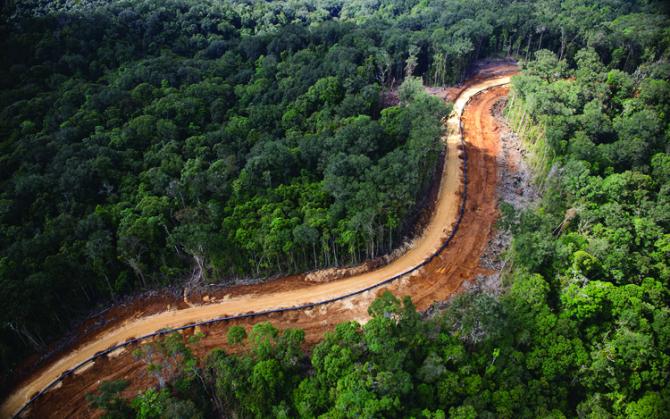
Decie Autin, ChE 80, helped lead ExxonMobil’s $19 billion project in Papua New Guinea.
At Georgia Tech, Decie Autin studied and trained to be an engineer, not a community relations expert. But when ExxonMobil selected her in 2008 to be the supervising project executive for the construction of a major new liquid natural gas pipeline, Autin knew that to be successful, she’d have to work closely with local families and landowners. It’s one of the many skills Autin has had to learn while moving up from front-line engineering to management.
However, this project wasn’t situated in any community close to Autin’s home in Houston. The pipeline was to be built halfway around the world in Papua New Guinea.This location presented extraordinary challenges for Autin and her team—and not just due to the distance.
For one, the Papua New Guinea Liquid Natural Gas (PNGLNG) pipeline proved to be intimidating simply because of the path it traces. “The line travels 700 kilometers to carry natural gas from the country’s highlands across terrain that’s very rugged, with lots of mountains and volcanoes, down to the coast near Port Moseby to be processed into LNG,” Autin says.
Culturally, the country is also very different than the United States. “Papua New Guinea has more than 800 languages,” Autin says. “And its people are spread out, 85 percent of them living in rural settings, living in little pockets.”
To complicate matters even more, most of the country’s roughly 7 million citizens had little-to-no experience seeing a woman in such a leadership position.
All of these added up to make the PNGLNG project the most challenging one she’s ever worked on in her 30-plus years with ExxonMobil. The logistical hurdles of building the pipeline from mountaintop to shore were trickier than she could have imagined. “When you face problems, you need to work through the logic to solve them,” Autin says. On the PNGLNG project, we faced so many issues: ‘How do you move this, how do you get these people to agree, how do you work with the government?’”
The pipeline’s remote point of origin demonstrated just one of several difficult problems that Autin and her team faced.
There was a single 800-kilometer highway into the Hides area where the natural gas was drilled and produced—the last 200 kilometers of which were unpaved. Faced with either building an airport or driving supplies all the way up that road, Autin loaded up in a truck and surveyed the road for herself. What she found was a major infrastructure project: There were not just 200 kilometers of road to pave, but also 98 bridges to cross, many of which required upgrades to use. “We ran the economics, and the airport won out,” Autin says.
Building the airport, the pipeline itself and other related work, the PNGLNG project employed up to 22,000 people at its peak. In total, more than 55,000 individuals from across the globe were somehow involved in the pipeline’s construction. After an estimated $19 billion in construction costs, the pipeline today produces 1 billion cubic feet of liquid natural gas each day.
And it was Autin who stood in charge of making sure everything went as planned. “My commitment was to deliver on the entire project,” she says.
Not only did Autin fulfill her commitment, she did so ahead of expectations. The PNGLNG project shipped its first cargo load of natural gas in May 2014, five months ahead of schedule. The liquid natural gas pipeline will meet rising natural gas demands in Asia—particularly Japan, Hong Kong and China.
As happy as Autin is with the PNGLNG’s technical successes, she also found tremendous fulfillment in her role working directly with the people of Papua New Guinea. ExxonMobil sponsored numerous community efforts throughout the duration of the pipeline construction and, during her free time, Autin became very involved in developing programs to help empower and train the country’s women. “One of ExxonMobil’s core efforts across the globe is to help educate women,” Autin says. “Anytime you educate the women in a community, you expand the limits of what they can do.”
In the end, Autin left a strong imprint on the nation—so strong that a Papua New Guinea firm, Hides Gas Development Company (HGDC), now sponsors the Decie Autin Engineering Scholarship for Women. HGDC Chairman Libe Parindali says Autin was chosen as the scholarship’s namesake to honor the pipeline as an impressive feat of engineering, as well as to tribute her humble and capable leadership.
Autin’s reaction fit the chairman’s description. “At first I was embarrassed … then I was proud,” Autin says. “I’m very fortunate and very blessed. There were plenty of women on our project team. Of all people, I thought it was interesting that they wanted to honor me.”
This originally appeared in Vol. 90, No. 4 of the Georgia Tech Alumni Magazine.
